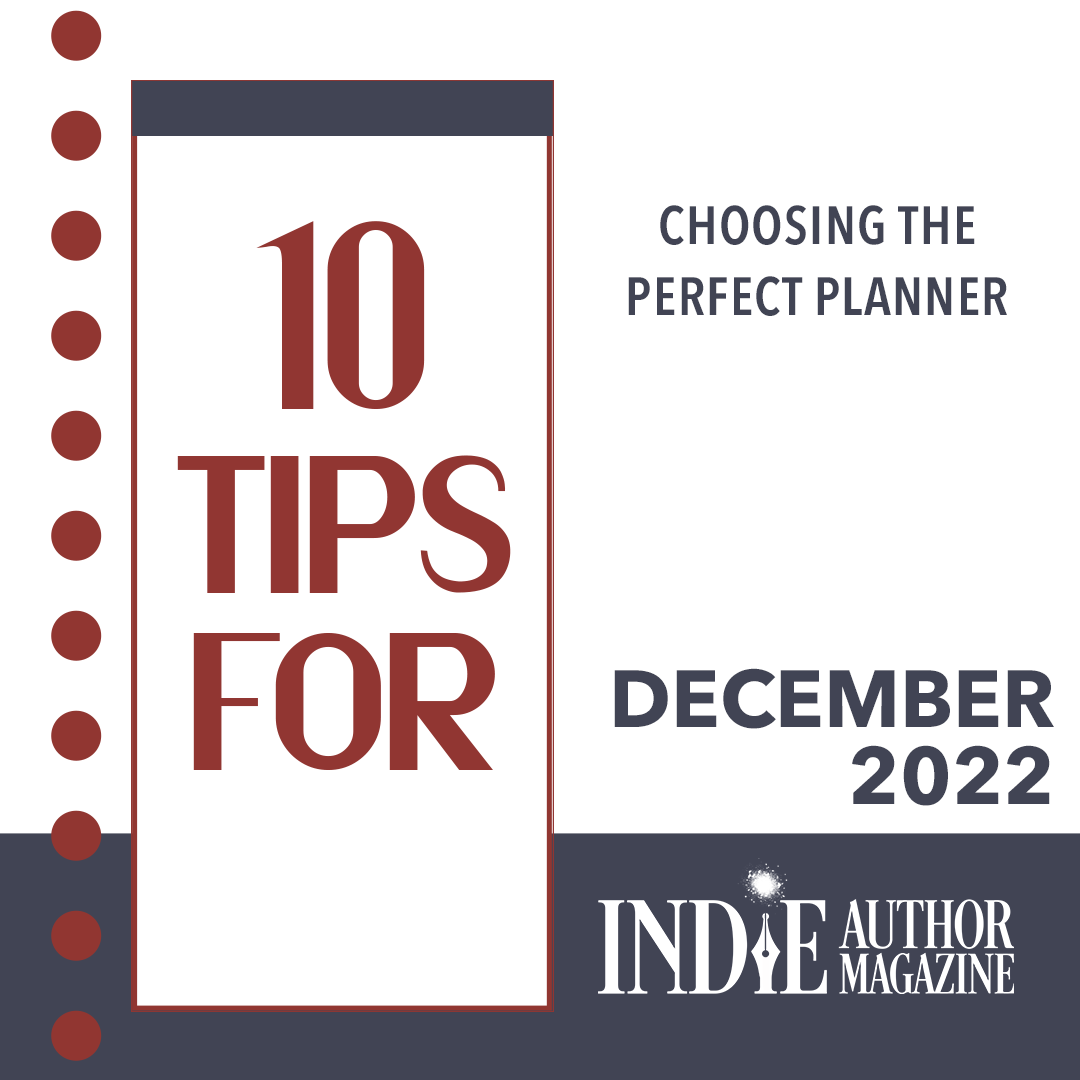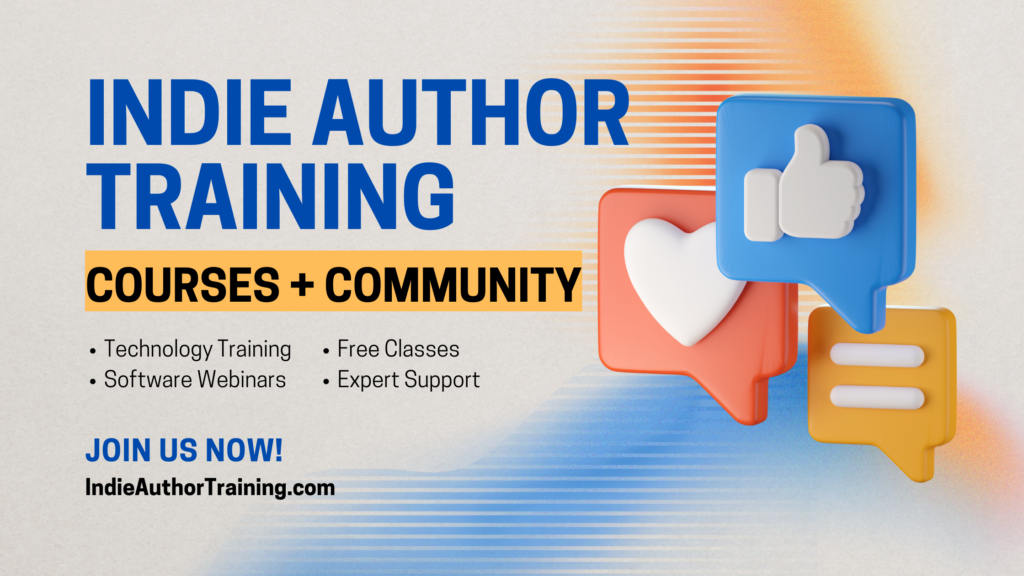Planners can be an excellent investment of your time and money, helping you create effective goals and build actionable plans. But with so many options available, it’s important to research which planner will work best for your unique writing life. Ahead of the new year, we’re breaking down ten things every author should keep in mind when selecting a planner so they can stay organized in their author business and beyond.
1. Consider your medium
When reviewing planners, consider which form of technology will best suit your preferences while encouraging good planning habits. Although pen and paper are a must for some, others prefer to go fully digital. It’s also possible to combine both physical and digital planners.
Pro Tip: The adage “Out of sight, out of mind” is especially true when it comes to planners, no matter which format you pick. If you select a paper planner, try to keep it on your desk or where you can lay it open in your writing space. This ensures you’re reminded to use it regularly. For those who choose a digital option, set reminders on your phone or computer to look at your planner so you’re clear on what you need to accomplish each day.
2. Create your own paper planner …
A variety of programs and software allow authors to create their own planners and print them at stores like Office Depot or using print-on-demand service providers like LuLu Press. Canva can be an intuitive and easy-to-use platform for formatting a custom planner that will fit your needs, and you can even order your design directly from the site when you’re finished.
3.… Customize a notebook or journal …
Another hands-on and affordable option for creating a custom paper planner is to purchase a notebook or journal and design your own unique pages. Incorporate designs that will help you create systems and habits, such as monthly calendars and habit trackers, and don’t be afraid to adjust your planning system as the year progresses to make something that works for you.
Pro Tip: Bullet journaling and notebooks are not for everyone. Although there are thousands of blog posts, websites, and videos dedicated to bullet journaling, it’s important to consider whether it’s suitable for you. Consider your propensity for perfectionism when creating something from scratch that will often include artistic expression and require a time investment to create pages for what will essentially become a handmade planner. If perfectionism is not an issue for you and you’re sure that you won’t spend an inordinate amount of time creating them, then it could be an excellent option for creating a customizable planning system unique to your life.
4.… Or build a digital planner
With programs as straightforward and accessible as PowerPoint and Keynote, authors who prefer a digital option can create their own hyperlinked planners for use on tablets or in programs like OneNote, GoodNotes, and Notability. Build the journal on your own, or pull from tutorials online, including graphic designer Jet Sy’s video tutorial walking users through the formatting process for Keynote on her YouTube channel, Jet Sy Traveling Designer.
5. Consider inspiration
When searching for your perfect planner, pay attention to layouts and interior designs that inspire you. With the right systems in place for planning, you can harness that inspiration and carry it with you throughout the year. Remember that each writer has different needs, motivations, and aspirations. The best planner for you is one that not only inspires you to plan but to keep it up long term for the best possible results.
6. Value function over aesthetics
The physical and digital shelves of stores are filled to bursting with beautiful, exciting planners. Unfortunately, the desk drawers and closets of many well-intentioned writers are filled with pretty planners that were never used to their fullest potential. Choose a planner that fulfills your planning needs in form and function first, and beauty as a far second.
Pro Tip: Style isn’t the most important aspect of selecting a planner, but it is still worth consideration. When you enjoy seeing your planner because you love the style, you are more likely to bring it along to writing events and keep it on top of your workspace instead of in a drawer.
7. Balance price with function
In some seasons of life, we bootstrap more than others, and in difficult economic climates, it’s imperative to be mindful of how you spend your money. But keep in mind that many planners cover a twelve-month period and cost far less over the course of a year than the amount we may spend on other incidentals, such as video streaming services, quick runs to your favorite shop, a junk food habit, clothing subscriptions, or other disposable income draws. There are many places where you can and should save money, but don’t skimp on your planner. Get the one you are most inspired to start—and keep—using. Remember to divide its cost by the number of months the planner covers to gain more perspective on the value provided.
8. Create a planning schedule
Half of the battle of using a planner to its fullest potential is to use it consistently. As soon as you choose a planner, create a schedule for quarterly, monthly, and weekly planning and review sessions. Decide on that schedule, and enter it as a non-negotiable appointment in your new planner on the applicable dates.
Pro Tip: Use reminders on your phone or calendar to reinforce your commitment to the planning schedule you’ve created.
9. Mind your time
Planning can be both fun and inspiring because it encourages us to tap into our desires and dreams. But planning should always be an effective investment of your most finite resource—time—and have a positive return on investment. If you spend so much time planning that you begin to use it as an excuse to procrastinate, the benefits of planning are significantly mitigated. Any time spent planning should be far less than the time you spend taking focused action that results in progress toward your most meaningful goals.
10. Live the change you want to see in your life
As you’re aiming for the next level of success in your authorship, think critically about exactly which parts of your life you wish to improve. Instead of waiting for a number, title, or milestone to begin embodying that next level of professionalism, incorporate those behaviors immediately. Ask yourself: How does that higher level of myself plan his or her writing and publishing schedule for the coming year? How does he or she build systems and habits for success? How does he or she invest in his or her writing career? How does he or she ensure he or she is making the best investment of his or her time, energy, and financial resources? Use your answers to set reminders to use your planner and to schedule regular planning and implementation sessions.






